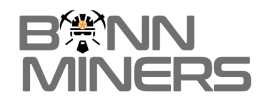Top five amazing facts about Bitcoin mining
What do you mean by Bitcoin mining?
Bitcoin mining is the process of solving problems to generate fresh bitcoin. It comprises competing computing systems that use specialized chips to solve mathematical challenges. The first Bitcoin miner to crack the challenge gets a Bitcoin prize. The mining procedure also validates and verifies transactions on the Bitcoin network.
Top five amazing facts about Bitcoin mining:
Why is Bitcoin mining important?
The computational work that the nodes in a blockchain network do to get extra tokens is called "mining." In actuality, miners are being compensated for acting as auditors. They are in charge of ensuring that Bitcoin transactions are legitimate.
A scenario in which a Bitcoin owner spends the same Bitcoin twice is double-spending. This isn't an issue with actual currency. Though counterfeit money is a possibility, it is not the same as spending the same money twice. There is a possibility that the holder might make a clone of the digital token and give it to a merchant or another party while maintaining the original.
What does "proof of work" mean?
A proof of work is a piece of data that was tough to create to meet particular standards. Checking whether data meets the standards should be simple. Producing a proof of work can be a random, low-probability procedure, requiring a lot of trial and error on average before a valid proof of work is achieved. Bitcoin uses the Hashcash proof of work.
The Problem Is Computationally Difficult
The SHA-256 hash of the header block must be equal or lower than to the goal for the block to be recognized by the network, making Bitcoin block mining a challenge.
This problem may be simplified to make it easier to understand: A block's hash must begin with a specific amount of zeros. Several tries are required because the likelihood of generating a hash that starts with numerous zeros is extremely low. A nonce is increased each round to create a new hash. For further information, see Proof of Work.
The Difficulty Metric for the Bitcoin Network
The difficulty of the Bitcoin mining network is a measure of how tough it is to locate a new block compared to the easiest it can ever be. The rate of block generation will increase as more miners join.
As the pace of block formation increases, the difficulty increases to compensate, slowing the rate of block-creation. Malicious miners' blocks that do not match the requisite difficulty goal will be ignored by the whole network, rendering them useless.
The Block Reward
When a block is discovered, the discoverer may be awarded a particular amount of bitcoins, which is decided by the whole network. Furthermore, the miner receives the fees paid by users that transmit transactions.
The fee is a way for the miner to be rewarded for including the transaction in their block. Fees will become a significantly larger part of mining income as the quantity of new bitcoins miners are permitted to generate in each block decreases.
Conclusion:
Bitcoin was mined on desktop computers with conventional central processing units for a short time after its inception (CPUs). However, the procedure was painfully slow. Large mining pools stretching over several continents now create bitcoin. Bitcoin miners group together mining devices that use a lot of power to mine the cryptocurrency. Bitcoin miners at Bonn Miners are a good way of generating passive income!
Payment plans available for some miners. Contact our team for more details regarding the payment plans we offer! This miner includes a 365 Day Warranty. For more details about our sales process, please see our Terms of Service.
